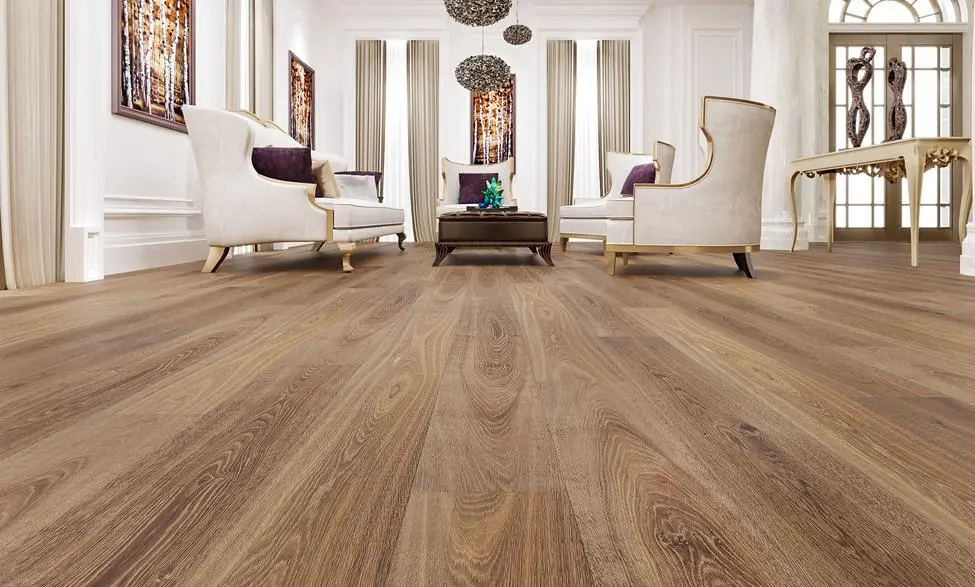Hardwood flooring is a popular choice for homeowners due to its timeless appeal and durability. It adds warmth, beauty, and value to any home, but like any other flooring option, it comes with its own set of advantages and disadvantages. In this article, we will explore the pros and cons of hardwood flooring to help you make an informed decision when considering this type of flooring for your home.
Pros of Hardwood Flooring
Natural Beauty and Timeless Appeal
One of the primary reasons homeowners choose hardwood flooring is for its natural beauty and timeless appeal. The rich colors, unique grain patterns, and varying textures of hardwood create an inviting and warm atmosphere in any room. Hardwood floors can complement any interior style, from traditional to contemporary, making them a versatile choice.
Durability and Longevity
Hardwood flooring is known for its exceptional durability and longevity. When properly cared for, hardwood floors can last for generations. Unlike other flooring materials that may wear out over time, hardwood can be refinished to restore its original luster and beauty. This makes it a long-term investment that adds value to your home.
Easy to Clean and Maintain
Hardwood floors are relatively easy to clean and maintain, making them a practical choice for busy households. Regular sweeping or vacuuming, along with occasional damp mopping, is usually sufficient to keep hardwood floors looking their best. Unlike carpets, hardwood does not trap dust, pollen, or other allergens, making it a healthier option for those with allergies.
Versatile and Customizable
Hardwood flooring offers a wide range of options in terms of wood species, finishes, stains, and plank sizes. This versatility allows homeowners to choose the perfect flooring to match their personal style and complement their interior decor. Whether you prefer a classic oak floor or a more exotic hardwood like Brazilian cherry, the options are endless.
Enhances Indoor Air Quality
Compared to carpet or synthetic flooring materials, hardwood flooring has a positive impact on indoor air quality. Hardwood does not harbor dust mites, pet dander, or other allergens that can affect air quality and trigger allergies. This makes hardwood flooring an excellent choice for individuals with respiratory conditions or sensitivities.
Cons of Hardwood Flooring
Higher Initial Cost
One of the main drawbacks of hardwood flooring is its higher initial cost compared to other flooring options. Hardwood floors can be more expensive to install, especially if you choose high-quality hardwood or opt for professional installation. However, it’s important to consider the long-term value and durability that hardwood offers, which can outweigh the initial investment.
Susceptible to Scratches and Dents
While hardwood flooring is generally durable, it is not completely immune to scratches and dents. Heavy furniture, pet claws, and sharp objects can cause visible damage to the surface of hardwood floors. However, with proper care and maintenance, such as using protective pads on furniture legs and promptly addressing spills, you can minimize the risk of scratches and dents.
Vulnerable to Moisture and Humidity
Hardwood flooring is sensitive to moisture and humidity, making it unsuitable for areas prone to excessive moisture, such as bathrooms and basements. Exposure to moisture can cause the wood to warp, swell, or even develop mold or mildew. It’s essential to maintain proper humidity levels in your home and promptly address any spills or water damage to protect your hardwood floors.
Requires Regular Maintenance
Although hardwood floors are relatively easy to clean, they do require regular maintenance to keep them in optimal condition. Periodic refinishing may be necessary to remove surface scratches, restore the shine, and protect the wood from wear and tear. Additionally, it’s important to follow manufacturer recommendations for cleaning products and techniques to avoid damaging the floor’s finish.
Noise and Echoes
Hardwood flooring can amplify sound and create echoes, especially in rooms with minimal furniture or soft furnishings. This can be a concern for those who prefer a quieter environment or live in multi-story homes. However, area rugs, curtains, and acoustic underlays can help reduce noise and minimize echoes, making hardwood floors more comfortable in terms of acoustics.
Conclusion
Hardwood flooring offers numerous advantages, such as natural beauty, durability, and easy maintenance, which make it a popular choice among homeowners. However, it’s essential to consider the higher initial cost, susceptibility to scratches and moisture, and the need for regular maintenance. By weighing the pros and cons, you can determine if hardwood flooring is the right option for your home.
FAQs (Frequently Asked Questions)
Q: Can hardwood flooring increase the value of my home?
A: Yes, hardwood flooring is often considered a desirable feature by potential homebuyers and can increase the value of your home.
Q: Can hardwood floors be installed in kitchens or bathrooms?
A: While it is possible to install hardwood floors in kitchens, bathrooms, or other high-moisture areas, it requires extra precautions and regular maintenance to protect the wood from moisture damage.
Q: How often should I refinish my hardwood floors?
A: The frequency of refinishing depends on various factors, including the amount of foot traffic and wear. On average, hardwood floors may need refinishing every 7 to 10 years.
Q: Can I install hardwood flooring myself?
A: While DIY installation is possible for experienced homeowners, professional installation is recommended for the best results, especially if you have little to no experience with flooring installation.
Q: Are there alternatives to hardwood flooring?
A: Yes, there are alternatives to hardwood flooring, such as laminate flooring, engineered wood flooring, and luxury vinyl planks, which offer similar aesthetics and durability at different price points.
In conclusion, hardwood flooring offers a unique blend of beauty, durability, and value. By weighing the pros and cons, considering your specific needs and preferences, you can make an informed decision about whether hardwood flooring is the right choice for your home. Remember to assess your budget, lifestyle, and the specific requirements of each room before making your final decision.

